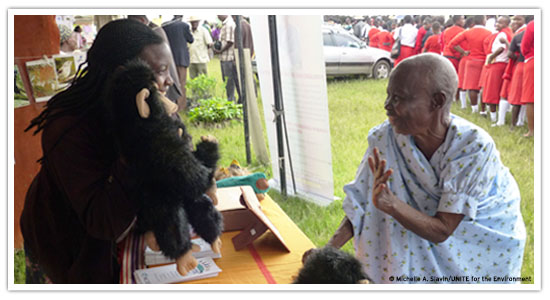Congratulations to Roselyn Kayesu on being selected as PEN's March Educator of the Month! Special thanks to Michelle A. Slavin for her nomination and blog submission.
It takes more than just knowledge to be an excellent primate educator. It takes passion, commitment, a thirst for knowledge, a willingness to try new things, and the ability to fail but get right back up again. In my nearly five years of working in Uganda with the North Carolina Zoo’s UNITE for the Environment (UNITE) conservation education program, I have had the pleasure of working with a great number of educators. Only a handful have all these qualities and one of them, Roselyn Kayesu, stands out.
Roselyn has been teaching for 13 years and involved with UNITE for four of those years as an upper primary schoolteacher at Bigodi Primary School. As a UNITE teacher, Roselyn attends three trainings every year (sometimes more) to learn more about conservation issues facing Uganda’s Kibale National Park, home to 13 species of primates. At the trainings, Roselyn learns how to use student-centered teaching methods in her classroom instead of the standard lecture, and how to integrate each topic into Uganda’s national curriculum. Because UNITE was established near East Africa’s largest chimpanzee population, it’s no surprise Roselyn has chosen to focus on the great apes. One visit to Roselyn’s classroom and you will realize she is devoted to the great apes of Uganda (mountain gorillas and chimpanzees). But she certainly cares for all primates.
In her classroom, Roselyn has an “Environmental Education” corner where she displays poems, drawings, and facts about mountain gorillas and chimpanzees. In Uganda, most rural schools and their teachers do not have money for learning aids, so Roselyn often requests to use UNITE’s “scratch paper” to create learning aids for her classroom or, on occasion, she purchases her own materials. Visiting Roselyn in the classroom to observe her (part of our core work) is always an absolute joy. She is engaging, has wonderful classroom management skills, and somehow manages to relate nearly any topic back to the conservation of Kibale National Park.
Roselyn doesn’t just attend trainings and make learning aids; she volunteers her time outside the classroom to move primate conservation forward: helping to develop and coordinate an annual Earth Day event for community members not once, but four years in a row. She once spent three days away from home and her children to educate people about chimpanzees at an event in a nearby town. She organized a community film showing for nearly 200 people in Bigodi village, and she has worked with UNITE to adapt great ape lessons for Ugandan classrooms.
For Roselyn, it doesn’t end in the classroom or with volunteerism; conservation is a lifestyle choice. Recently, I had the opportunity to visit Roselyn at home where she was recovering from a motorcycle accident (she’s going to be fine!). When I arrived, the first thing I found was a keyhole garden that she built after learning it was a good way to conserve soil and water while providing crops on a small piece of land. Three meters away, I ducked into Roselyn’s kitchen to find a fuel efficient stove, which she built herself and uses it to cook her meals.
While exploring Roselyn’s conservation projects, I could hear children chatting and singing nearby. When I asked Roselyn what was going on she said, “Oh, that’s my school”. I thought I heard wrong. But no, in her free time (Did I mention she is a mother to three and has a full-time job?), Roselyn started a private school in her home. She has five teachers and almost 160 students in Primary One through Five. The school is not part of UNITE, but Roselyn takes what she learns at UNITE trainings and trains the teachers in her school about primate conservation. Once a month, the younger students draw pictures of the wild animals they have been learning about while the older students debate conservation topics. Every day, the students collect waste from the community and when the rubbish bin is full, they make balls from the used plastic.
When I sat down to talk with Roselyn in her sitting room, I couldn’t help but notice that there was a drawing of a chimpanzee on her wall and a chair full of stuffed toy monkeys. The woman has serious love for primates! I asked Roselyn why she thinks primate conservation is so important and she told me, “There are four main reasons I think primates are important. First, they are at great risk of being destroyed by the hunters and their snares, so we must protect them. Second, the Ugandan economy relies on them because tourists come to see primates in our country. Third, primates are instrumental to the ecological balance of life. Finally, all primates deserve life...aren’t we primates too?”
Roselyn doesn’t have a smart phone nor does she have a computer. She has an e-mail account, but she only checks it once a month or so. She is not someone who will be able to access PEN’s website or Resource Library, so she depends on UNITE to provide her with information from PEN. However, when I explained to Roselyn what PEN is and how it works, and then asked her how she could benefit from this kind of network and what value it has, she said, “A network for primate educators is helpful in order to get information worldwide about primates, to discover what is happening outside of Uganda, and to learn about how to conserve primates. My school and UNITE can benefit from a network like this by gaining skills and knowledge to better integrate primate education into our lessons.”
To use a common Ugandan phrase, Kayesu Roselyn has primate conservation “on her heart” and is an absolute inspiration to not only her students, but to me as well. I couldn’t be happier that she has been selected as PEN’s Educator of the Month.

Learn more about UNITE; watch this video, highlighting their work in Uganda!








